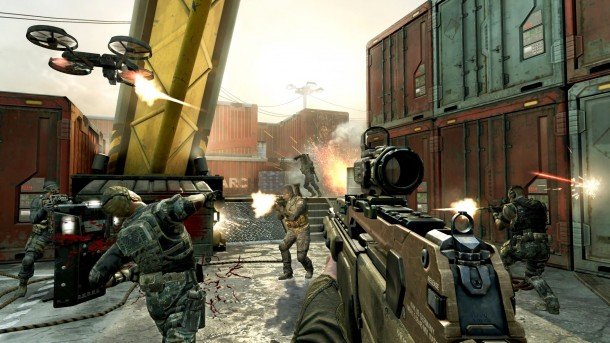Violence and videogames: we look at the studies cited in the aftermath of Sandy Hook

In the wake of the horrific shooting at Sandy Hook Elementary School last week, it's understandable that people would look to place blame. Many in the media have been quick to suggest a link between shooter Adam Lanza's interest in videogames and the violence he perpetrated. Does the evidence support their claims? My research suggests not.
I've taken a look at the reports videogame-detractors have referenced, and talked to the author of an oft-cited study about the conclusions being drawn from his work. If video games do cause increased aggression, then it's not supported by the data available, and to suggest otherwise is to misrepresent the prevailing scientific opinion.
For the most part, reporting on such a link has been both weak and disingenuous (see Eurogamer's coverage of the British tabloids). Stories highlight games Lanza played, repeatedly focus on their violence, then sidestep the need for scientific evidence by never making their implied accusation explicit. But a CNN report (picked up by Reddit ), about Lanza's connection to Starcraft, was notable for featuring a supposed expert making a direct connection between violent games and aggression, then naming sources that, he says, can prove his claims.
First, the interview:
Let's ignore the abrupt shift from the specific example of Lanza having played Starcraft in high school, to the broad "is there a link between violent video games and aggressive behaviour." It's another transparent attempt to suggest there is, while not actually stating that there is. Instead, we'll look at the claims made by Iowa State University's Professor Craig Anderson.
"Every major scientific society that has studied the question has come to the same answer … Media violence is a risk factor... is a causal risk factor for increased aggressive behaviour, including violence."
In the full interview (transcript here , two-thirds down the page) Anderson notes how that aggressive behaviour manifests:
The biggest gaming news, reviews and hardware deals
Keep up to date with the most important stories and the best deals, as picked by the PC Gamer team.
"Well, there are a several ... there are number of processes going on. So in the short term, that is right while one is playing the game and for a brief period afterwards, aggressive thoughts are more available. So if a provocation occurs in that time period you're more like to see it as a provocation and aggressive solutions are more likely to come to mind.
"Longer term we get changes in attitudes towards using aggressive solutions, changes in how one interprets, say, ambiguous situations. So you get bumped into say a child in a lunchroom. Those who play a lot of violent video games are more likely to interpret that a bump as intentional and they are more likely to respond by pushing back or maybe even starting a fight."

Is there anything to these claims? Anecdotally, you'd say no. After all, Starcraft - the game specifically highlighted by CNN - holds numerous esports tournaments starring people who play the game professionally for a living. So far, none of them have descended into a mass brawl come the grand final. These accusations always sound ridiculous because we can look to our own lives - the games we play and our treatment of others - and claim foul play. But if we're to reach a solid conclusion we need to move away from personal experience and engage with the data.
In which case, let's look at the evidence Anderson is presenting. He mentions that the most recent body to support the link is the International Society for Research on Aggression . Curiously he fails to mention that he's the director of the society, and as such commissioned their report .
This odd omission aside, the findings appear to show statistically significant evidence of a connection between violent media (specifically games) and aggression: "The results of all of these meta-analyses show that exposure to media violence can increase not only aggressive behavior in a variety of forms, but also aggressive thoughts, aggressive feelings, physiological arousal, and decrease prosocial behavior."
Further, the report also gives some reasons for the lack of a general acceptance for their apparently conclusive link. They mention people who "mistakenly think that media violence effects must be immediate and severe," when the "truth," they explain, is much less dramatic and instantaneous. Then there's those who have a "vested interest in violent media." "...The need to maintain a positive self-image motivates the denial of media violence effects." I think they're talking about us.
But dig deeper into ISRA's data and the sources behind it, and you'll discover counterpoints to their analysis that are both impartial and informed.
One of the prominent meta-analyses quoted is from a 2007 study by Texas A&M International University's Professor Christopher Ferguson. Out of context, the study's data would appear to agree with the ISRA's conclusion, but Ferguson's own interpretation was vastly different, noting numerous problems with the way games violence research was conducted and published.
I contacted Christopher Ferguson to ask about the apparent misrepresentation of his findings in the ISRA's report. His reply leaves no doubt as to his opinion of its legitimacy:
"Anderson referring to the ISRA's report is something we call "echo attribution." He in fact nominated all the individuals to sit on the committee, and simply didn't include any scholars who had been critical of the 'video games = aggression' link. If I put together a committee and stack the deck, I can get it to say almost anything. That statement has no credibility whatsoever.
"As for using my study, they absolutely misused and misrepresented my meta-analysis in that report. My data should, in no way, ever be used to support links between video game violence and aggression. We have done a number of studies of video game violence with both children and adults and find no evidence to support links between video game violence and youth violence. Furthermore, youth violence has declined to 40 year lows, not gone up in recent years."
Ferguson points to recent findings by the US Supreme Court, and the Swedish and Australian governments as evidence of the inconclusiveness of the currently available studies. While the Supreme Court's decision , blocking a California law that banned the sale of violent games to minors, concentrated mainly on the First Amendment argument, both governmental reports found significant fault in the methodology of current research.

The Swedish Media Council note that, while there is a statistical connection between aggression and VCGs (violent computer games), the hypothesis that they cause this aggression "is grounded in serious methodological deficiencies and cannot therefore be considered proven."
More likely, they note, are the possibilities that either aggressive people look for VCGs to play - "support for this hypothesis is extensive in the existing research" - or that underlying factors contribute to both aggression and VCG preference. "This hypothesis," they conclude, "is supported by all studies that investigated underlying factors such as mental behavioural problems and the family-social interaction."
The Australian Attorney General's departmental review into video game violence comes to much the same conclusion. Except they call them violent video games (VVGs).
"Overall, the literature examining VVG effects on aggression is divided. A 2010 meta-analysis involved vast numbers of studies and participants, and is viewed as the pinnacle of the debate so far." This refers to Anderson's own report, which he references in the CNN interview, and provides a large basis for the ISRA's findings.
"However, there are a number of issues that have been raised with the VVG effect literature
that arguably reduce the literature's policy relevance." They note the social and political controversy surrounding the issue, the "insufficient" exploration of underlying effects, and the lack of conclusive evidence showing games as more violent than other media as among their reasons for their concern. And this is Australia, one of the harshest video game censors in Western society.
It's worth stressing that both of these studies had access to, and extensively reference, exactly the same data that the ISRA quote in their report. Yet where they both find inconsistency and questionable methodology, the ISRA sees only blind reinforcement of their beliefs. It's absolutely staggering that Anderson can use that research to categorically state on a national news channel that there's a connection between violent games and aggression, insinuate that any criticism of that connection is an attempt by the game industry "to keep the general public confused about what the research shows", and at no point be challenged on his accusations.
In his email, Ferguson finished by saying, "As often happens with moral panics, you can find some scholars who will make extreme, exaggerated statements. This is just such a case. It is a shame to see such a tragedy politicized in such a way."
And that's the problem surrounding the debate. If the methodology is flawed, the results are up for both interpretation and manipulation. In his interview, Anderson displays a flagrant disregard for the many dissenting opinions. It's frustrating for two reasons. Firstly, because at such an emotionally charged time, it's appalling to see someone misrepresenting a complex and nuanced issue.
But also, if there's any correlation between violent games and aggressive behaviour, it's in our interest as gamers to know about it. Instead the issue gets consistently obfuscated by a politically motivated agenda, increasing the noise, and reducing the chance for a level-headed, scientifically focused debate.

Phil has been writing for PC Gamer for nearly a decade, starting out as a freelance writer covering everything from free games to MMOs. He eventually joined full-time as a news writer, before moving to the magazine to review immersive sims, RPGs and Hitman games. Now he leads PC Gamer's UK team, but still sometimes finds the time to write about his ongoing obsessions with Destiny 2, GTA Online and Apex Legends. When he's not levelling up battle passes, he's checking out the latest tactics game or dipping back into Guild Wars 2. He's largely responsible for the whole Tub Geralt thing, but still isn't sorry.

